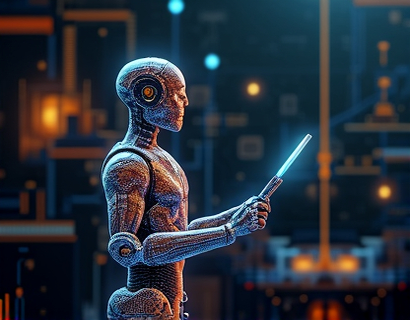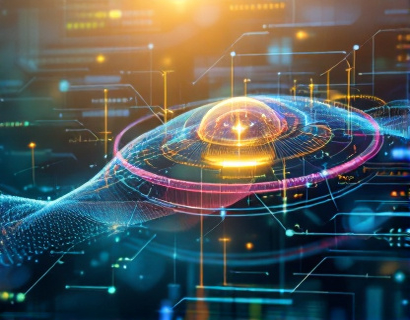Crypto and AI: Pioneering Enhanced Digital Experiences with Next-Gen App Solutions
The intersection of cryptocurrency and artificial intelligence (AI) is giving rise to a new era of digital innovation, where the synergy between these two cutting-edge technologies is redefining how we interact with digital applications and services. This fusion is not only enhancing the efficiency and security of digital experiences but also opening up unprecedented possibilities for connectivity and innovation. As we delve into this transformative landscape, it becomes evident that the convergence of blockchain and AI is paving the way for next-generation app solutions that promise to revolutionize various sectors, from finance and healthcare to entertainment and beyond.
The foundation of this revolution lies in the unique properties of blockchain technology, which provides a decentralized, transparent, and secure framework for transactions and data management. When combined with the advanced capabilities of AI, such as machine learning and natural language processing, the potential for creating intelligent, adaptive, and user-centric applications becomes immense. This article explores the key areas where crypto and AI are making significant impacts, highlighting how these technologies are being leveraged to build more robust, secure, and seamless digital experiences.
Enhancing Security with Crypto and AI
One of the most critical aspects of digital applications is security, and the integration of cryptocurrency and AI is significantly bolstering security measures. Traditional security protocols often rely on centralized systems, which can be vulnerable to breaches and hacks. Blockchain, with its decentralized nature, offers a more resilient alternative. By using AI to monitor and analyze blockchain transactions in real-time, anomalies and potential threats can be detected and mitigated swiftly. This proactive approach to security ensures that user data and transactions remain protected against emerging cyber threats.
Moreover, AI-driven cryptography is enhancing the encryption of data, making it more difficult for unauthorized parties to decipher sensitive information. Machine learning algorithms can adapt to new patterns of attacks, continuously updating encryption methods to stay ahead of potential vulnerabilities. This dynamic approach to security is crucial in an era where cyber threats are becoming increasingly sophisticated.
Optimizing User Experiences through AI
AI is playing a pivotal role in optimizing user experiences within digital applications. By leveraging machine learning, apps can learn from user behavior and preferences, tailoring content and functionalities to individual needs. This personalization not only enhances user satisfaction but also increases engagement and retention. For instance, recommendation systems powered by AI can suggest products, services, or content that align with a user's interests, creating a more intuitive and satisfying experience.
Natural language processing (NLP) is another AI technology that is transforming how users interact with digital applications. Chatbots and virtual assistants, driven by NLP, can provide instant and accurate responses to user queries, mimicking human-like conversations. This not only improves customer support but also reduces the workload on human agents, making services more efficient and accessible. The integration of voice recognition further enhances this experience, allowing users to interact with apps using natural speech commands.
Blockchain-Based Authentication and Identity Management
Identity verification and authentication are critical components of any digital application, and the combination of blockchain and AI is revolutionizing these processes. Traditional identity management systems often rely on centralized databases, which can be compromised. Blockchain offers a decentralized solution for storing and verifying identities, ensuring that user data is secure and tamper-proof. AI enhances this process by analyzing patterns and behaviors to authenticate users more accurately and efficiently.
Self-sovereign identity (SSI) is an emerging concept that leverages blockchain and AI to give users control over their digital identities. Users can manage their identity credentials and share them selectively with service providers, without the need for intermediaries. AI algorithms can verify the authenticity of these credentials, reducing the risk of fraud and enhancing trust in digital interactions. This approach not only empowers users but also streamlines the authentication process for businesses.
Smart Contracts and Automated Processes
Smart contracts, self-executing contracts with the terms directly written into code, are another area where crypto and AI are making significant strides. These contracts can automatically trigger actions based on predefined conditions, eliminating the need for intermediaries and reducing transaction costs. AI can further enhance smart contracts by analyzing data and predicting outcomes, ensuring that the conditions are met accurately and efficiently.
In the realm of supply chain management, for example, smart contracts can track the movement of goods in real-time, ensuring transparency and accountability. AI can analyze data from various sources to optimize logistics, predict delays, and identify bottlenecks, making the entire process more efficient and reliable. This synergy between blockchain and AI is particularly valuable in industries where trust and transparency are paramount.
Decentralized Finance (DeFi) and AI-Driven Investments
Decentralized finance (DeFi) is a rapidly growing sector that is benefiting greatly from the integration of AI. DeFi platforms leverage blockchain to provide financial services such as lending, borrowing, and trading, without the need for traditional financial institutions. AI algorithms can analyze vast amounts of market data to identify trends, predict price movements, and optimize investment strategies. This enables users to make more informed decisions and potentially achieve higher returns.
Risk management is another area where AI is making a significant impact in DeFi. By continuously monitoring market conditions and user behavior, AI can detect potential risks and suggest mitigation strategies. This proactive approach helps in maintaining the stability and integrity of DeFi ecosystems, making them more attractive to a broader range of users.
Healthcare Innovations with Crypto and AI
The healthcare industry is witnessing a transformative shift with the adoption of crypto and AI technologies. Patient data security and privacy are critical concerns, and blockchain provides a secure and transparent way to manage medical records. AI can analyze these records to identify patterns and insights, aiding in diagnosis, treatment planning, and personalized medicine. The combination of these technologies ensures that sensitive health information is protected while leveraging data to improve patient outcomes.
Telemedicine platforms powered by AI and blockchain are also becoming more prevalent. These platforms use AI to provide remote consultations, monitor patient health in real-time, and manage prescriptions. Blockchain ensures that all interactions and data exchanges are secure and verifiable, building trust between patients and healthcare providers. This integration not only enhances the quality of care but also makes healthcare more accessible, especially in underserved regions.
Entertainment and Media: Enhanced Experiences through Crypto and AI
The entertainment and media industry is another sector where the fusion of crypto and AI is creating innovative experiences. Blockchain can be used to create decentralized content distribution platforms, allowing creators to monetize their work directly without intermediaries. AI can analyze viewer preferences and behavior to curate personalized content recommendations, enhancing user engagement and satisfaction.
Virtual reality (VR) and augmented reality (AR) experiences are also being elevated through the use of AI and blockchain. AI can generate dynamic and interactive content, while blockchain ensures that digital assets and ownership are securely managed. This synergy is opening up new possibilities for immersive entertainment, from virtual concerts to interactive storytelling.
Challenges and Considerations
While the potential of crypto and AI is vast, there are several challenges and considerations that need to be addressed. Regulatory frameworks are still evolving, and the lack of clear guidelines can pose risks for businesses and users. Ensuring compliance with data protection laws and financial regulations is crucial. Additionally, the technical complexity of these technologies can be a barrier to adoption, requiring education and training to bridge the knowledge gap.
Scalability is another significant challenge, particularly for blockchain networks. As the number of transactions increases, the performance and efficiency of these networks need to be optimized. AI can play a role in solving some of these technical challenges, but ongoing research and development are essential to overcome these hurdles.
Conclusion
The convergence of cryptocurrency and artificial intelligence is ushering in a new era of digital innovation, where the boundaries of what is possible are being constantly pushed. By enhancing security, optimizing user experiences, and enabling decentralized solutions, this fusion is transforming various industries and creating new opportunities for growth and connectivity. As we continue to explore and harness the potential of these technologies, the future of digital interactions looks brighter and more promising than ever.











































